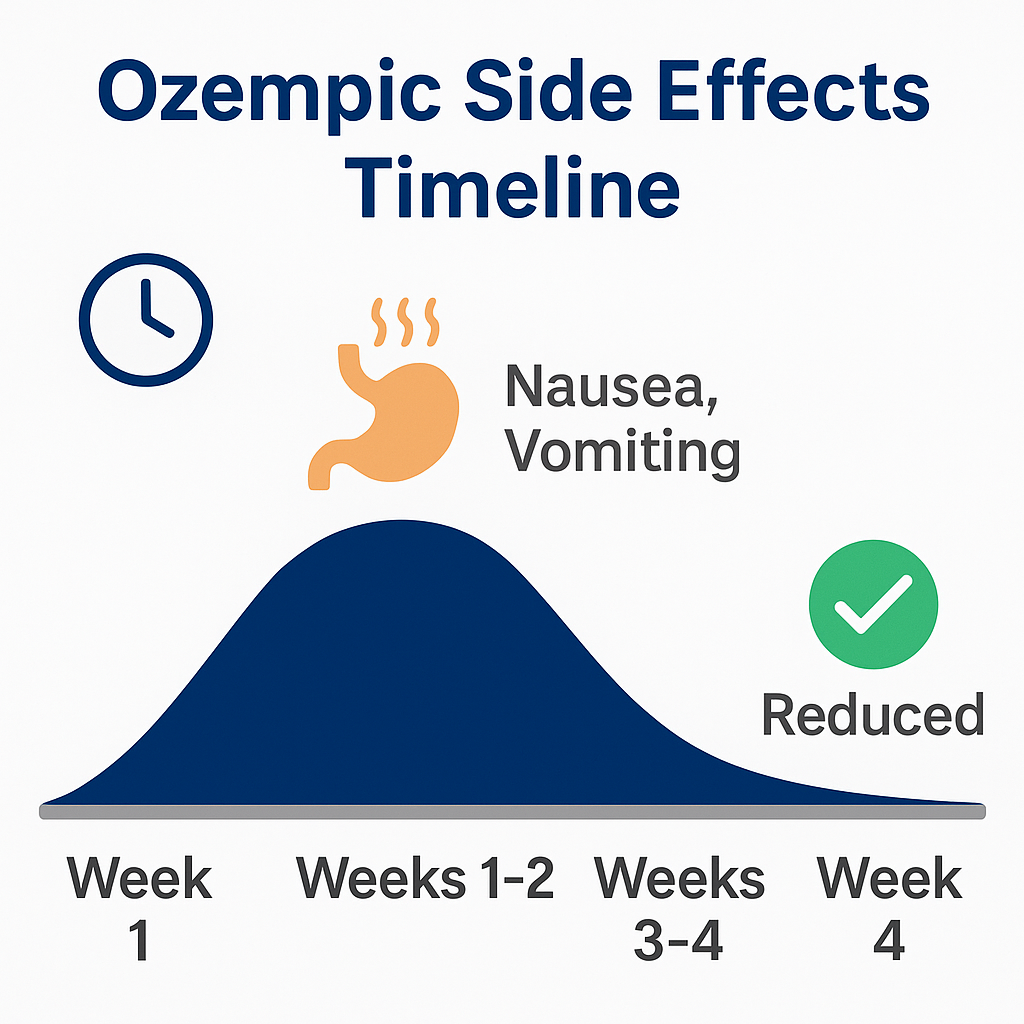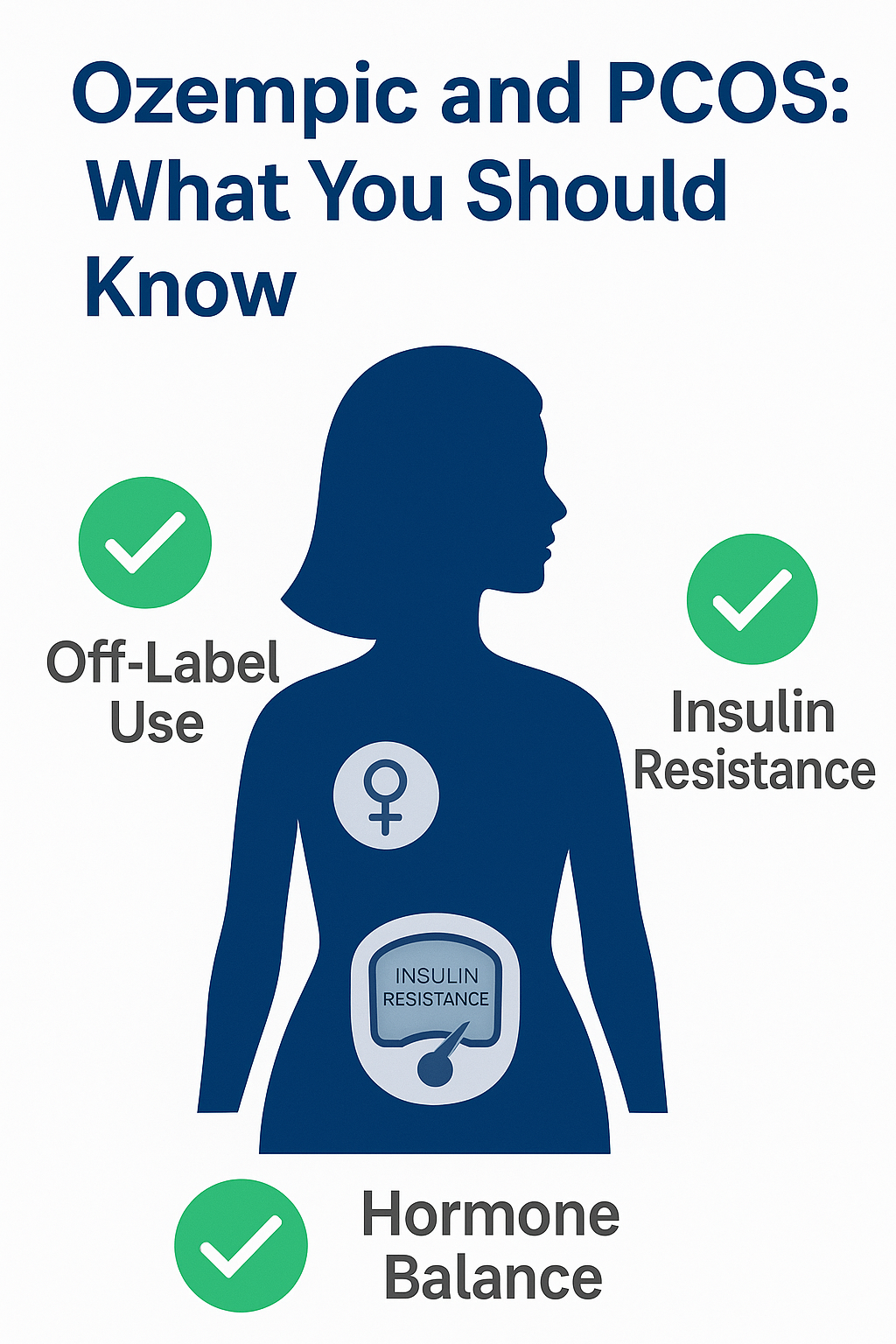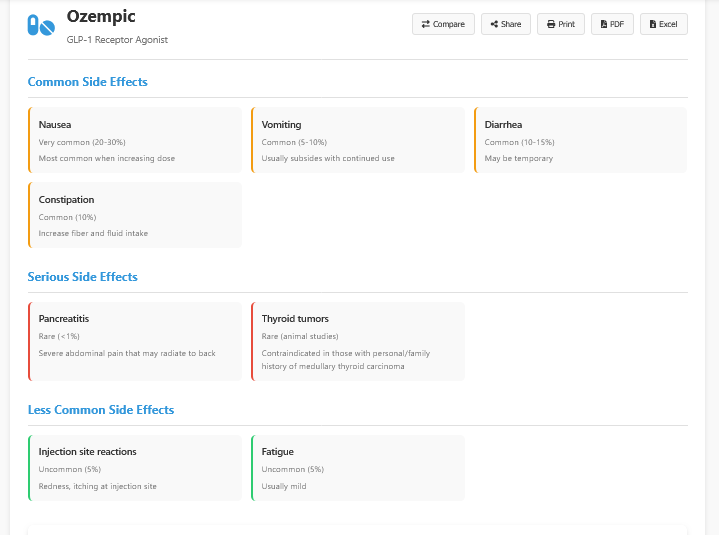Ozempic for Weight Loss, Prediabetes & PCOS: Dosage, Side Effects, and More
Introduction
Ozempic (semaglutide) is an FDA-approved injectable medication initially developed to manage type 2 diabetes by improving blood sugar control. However, in recent years, Ozempic has gained widespread attention for its remarkable benefits beyond diabetes, particularly in aiding weight management and hormonal disorders. Patients and providers are now exploring Ozempic for weight loss near me, as well as Ozempic for weight loss online, thanks to its effectiveness in curbing appetite and supporting metabolic health.

The popularity of Ozempic continues to grow among individuals struggling with conditions like PCOS, insulin resistance, and early stages of diabetes. Clinical research and user testimonials are increasingly highlighting the benefits of Ozempic for PCOS, especially in managing irregular cycles and weight gain. Likewise, Ozempic for insulin resistance is becoming a popular approach to restore healthy glucose function. Many are even considering Ozempic for prediabetes as a preventive strategy, searching both Ozempic for weight loss near me and Ozempic for weight loss online to find accessible treatment options.
As interest surges, it’s important to understand the full picture—including side effects, proper dosing, and how to find the right provider. Whether you're considering Ozempic for PCOS, looking into Ozempic for insulin resistance, or managing Ozempic for prediabetes, this guide covers it all. Plus, we’ll walk you through how to obtain Ozempic for weight loss near me or how to order Ozempic for weight loss online safely and conveniently.
Ozempic Side Effects – How Long Do They Last?
If you're starting Ozempic for weight loss, diabetes, or other conditions, it's natural to wonder: Ozempic side effects how long does it last? Many users experience symptoms like nausea, fatigue, vomiting, or diarrhea within the first few weeks. These reactions are typically a result of your body adjusting to semaglutide, the active ingredient in Ozempic. But how long do Ozempic side effects last? For most people, the discomfort peaks within the first two weeks and gradually fades as the body adapts to the medication. However, some may ask, how long does Ozempic side effects last? While this phrasing is slightly off grammatically, it reflects what many search online—and the answer is that side effects usually improve after dose stabilization.

One of the most searched concerns is, does Ozempic make you throw up? Yes, nausea and occasional vomiting are among the top reported side effects, especially when increasing your dose. So if you’re asking, Ozempic side effects how long does it last, the severity of symptoms like vomiting usually decreases after 4 to 6 weeks. But again, how long do Ozempic side effects last can vary based on individual sensitivity and how well your diet aligns with your treatment. It's worth noting that staying hydrated and avoiding high-fat meals can ease the nausea.
If you’re worried and keep searching how long does Ozempic side effects last or does Ozempic make you throw up, remember that small steps like eating bland foods, starting with a low dose, and taking your shot at the same time weekly can help. The question of Ozempic side effects how long does it last may not have a one-size-fits-all answer, but with good management, most users see symptoms ease. And if you're still wondering, how long do Ozempic side effects last, consult your doctor if symptoms persist beyond 6–8 weeks. For some, switching to a slower titration schedule or adjusting their diet can significantly reduce side effects.
Ozempic for Weight Loss – Does It Work?
Ozempic has quickly become one of the most talked-about medications for effective fat reduction and BMI management. Clinical studies show that patients using Ozempic experienced significant weight loss, with many shedding up to 15% of their body weight. Whether you're searching for Ozempic for weight loss near me or researching Ozempic for weight loss online, it’s important to know that this medication is designed to regulate appetite and slow digestion, helping users lose fat rather than just water weight. With consistent use and the right dosage, it has proven results in reducing visceral fat and improving metabolic health.

People often start their journey by looking for Ozempic for weight loss near me to find local clinics, endocrinologists, or weight-loss centers offering supervised prescriptions. However, with the rise of telehealth, Ozempic for weight loss online has become a convenient option for many. Licensed virtual healthcare platforms now assess your medical history and prescribe Ozempic without requiring in-person visits. Whether you're interested in in-clinic support or remote consultation, exploring both Ozempic for weight loss near me and Ozempic for weight loss online ensures you find the right solution for your lifestyle and health goals.
If you’re wondering how to get started, searching Ozempic for weight loss near me is a good first step to locate nearby physicians who can evaluate your BMI and eligibility. At the same time, platforms that offer Ozempic for weight loss online allow quick access through telehealth consultations, often delivering medications directly to your doorstep. By combining lifestyle changes with medical supervision, both Ozempic for weight loss near me and Ozempic for weight loss online open up realistic and safe paths for people ready to commit to long-term fat loss and better health.
Ozempic for Prediabetes, PCOS, and Insulin Resistance
Ozempic, a GLP-1 receptor agonist, is showing promising results beyond its original use in type 2 diabetes management—especially when it comes to ozempic for prediabetes, ozempic for PCOS, and ozempic for insulin resistance. By mimicking the GLP-1 hormone, Ozempic enhances insulin secretion, reduces appetite, and slows gastric emptying, which together contribute to improved blood sugar control and potential weight loss. As more individuals search for alternative solutions for metabolic health, the interest in ozempic for prediabetes, ozempic for PCOS, and ozempic for insulin resistance continues to rise due to these multifaceted benefits.

Clinical research highlights how ozempic for prediabetes can delay or even prevent the onset of type 2 diabetes by improving insulin sensitivity and reducing HbA1c levels. For women struggling with hormonal imbalance, ozempic for PCOS may help by regulating insulin and androgen levels, promoting weight loss, and restoring ovulation cycles. Additionally, ozempic for insulin resistance is gaining attention for its ability to support better glucose uptake by cells and reduce systemic inflammation, especially in patients who haven’t responded well to traditional therapies. Each of these conditions—prediabetes, PCOS, and insulin resistance—have different goals, but Ozempic’s hormonal regulation offers a unifying mechanism of action.
What sets Ozempic apart is the growing body of evidence supporting its effectiveness across diverse metabolic disorders. Those considering ozempic for prediabetes will find its glucose-lowering benefits particularly compelling, while individuals exploring ozempic for PCOS may be drawn to its positive impact on weight management and reproductive health. Meanwhile, ozempic for insulin resistance offers hope for improved long-term glycemic control and overall metabolic function. Whether prescribed off-label or as part of a broader treatment plan, the role of Ozempic in addressing these conditions is becoming increasingly well-supported in clinical practice.
Understanding Ozempic Dosage & Dosing Guidelines
Getting the right dosage Ozempic is essential for safe and effective results, especially if you're using it for weight management. The standard ozempic dosing starts at 0.25 mg per week, allowing your body to adjust and minimize potential side effects like nausea or vomiting. A gradual ozempic dose increase typically follows, moving to 0.5 mg, then 1 mg, and potentially higher. For those aiming at weight loss, understanding the ozempic dosage chart helps track your progress and determine the next step. Many patients seeking sustainable results follow a medically supervised plan that includes ozempic dosing for weight loss, especially when targeting fat reduction without muscle loss. The ozempic dosage for weight loss can vary based on individual tolerance and response. The goal is to reach the highest dose of ozempic that's both safe and effective under doctor guidance.

Here’s a quick overview of the ozempic dosage chart commonly used by healthcare providers:
- Week 1–4: 0.25 mg (Starting dose to reduce side effects)
- Week 5–8: 0.5 mg
- Week 9–12: 1 mg
- Week 13–16: 1.7 mg (Optional transitional dose)
- Week 17+: 2.0 mg or up to 2.4 mg (if switching to Wegovy)

Always consult a professional before adjusting your dosage ozempic, especially when considering a shift to higher concentrations like 2.0 or 2.4 mg. While the ozempic dosage for weight loss can deliver powerful results, patient safety is the top priority. Experts recommend slow ozempic dose increase strategies, which align with the structured ozempic dosing chart. By sticking to a guided ozempic dosing for weight loss plan, you reduce side effects while increasing long-term success. Remember, the highest dose of ozempic isn’t for everyone—it’s reserved for those who tolerate earlier stages well. Track your progress using the ozempic dosage chart and adjust only under medical supervision.
Diet for Ozempic – What to Eat While on Ozempic
Following the right diet for Ozempic can significantly enhance your results and reduce unpleasant side effects like nausea or bloating. Focus on nutrient-dense foods such as lean proteins, whole grains, fresh fruits, and non-starchy vegetables to support your body's response to the medication. A clean, balanced diet for Ozempic also means avoiding greasy, fried, or highly processed foods, which may worsen gastrointestinal symptoms. Limiting sugar, carbonated drinks, and high-fat meals can also help your digestive system adjust to the treatment more smoothly.
Maintaining portion control, proper meal timing, and hydration is essential when planning a diet for Ozempic. Instead of eating large meals, opt for smaller, frequent meals throughout the day to avoid spikes in blood sugar and reduce the chances of feeling nauseous. Drinking plenty of water—at least 8–10 glasses a day—will help flush toxins and support digestion. Incorporating high-fiber foods like oats, lentils, and berries into your diet for Ozempic can also improve satiety and reduce hunger cravings, especially during the early stages of treatment.
Here's a sample diet for Ozempic: Start your day with a protein-rich breakfast like scrambled eggs and spinach. For lunch, opt for grilled chicken with quinoa and mixed greens. Snack on a handful of almonds or Greek yogurt, and finish the day with salmon, roasted vegetables, and brown rice. This sample diet for Ozempic is designed to maintain steady blood sugar while minimizing side effects. Remember, a personalized diet for Ozempic created with a dietitian can yield even better results, ensuring your nutritional needs are met while maximizing weight loss.

Where to Find Ozempic for Weight Loss Near You or Online
If you're actively searching for ozempic for weight loss near me, you're not alone. Many people are turning to this FDA-approved medication to support their weight loss journey. Local weight-loss clinics, endocrinologists, and even some primary care providers now offer ozempic for weight loss near me for eligible patients. However, the growing demand has also led to a surge in digital options. If you're unable to find a provider in person, consider exploring ozempic for weight loss online through reputable telehealth services. These platforms often provide virtual consultations and prescriptions, making it easy to get ozempic for weight loss online from the comfort of your home.
One of the biggest benefits of telehealth is convenience. With just a few clicks, you can connect with licensed professionals who can evaluate your health history and determine if you're a candidate for ozempic for weight loss online. It's especially helpful for those who live in rural areas or have limited access to in-person providers. While searching for ozempic for weight loss near me might bring up several local clinics, availability can vary based on your region. That’s why many turn to ozempic for weight loss online as a faster and more flexible alternative. Still, it's crucial to verify the legitimacy of online services before committing to ensure you’re receiving safe, legal treatment.

Whether you choose to find ozempic for weight loss near me through a local clinic or get ozempic for weight loss online via telehealth, safety should always come first. Avoid unverified websites that offer suspiciously low prices or skip medical evaluations. Authentic providers, whether online or in person, will require a health screening before prescribing ozempic for weight loss online. Many reputable telemedicine companies offer prescription fulfillment and follow-up care, bridging the gap for those who can’t access ozempic for weight loss near me. Ultimately, whether you're pursuing ozempic for weight loss near me or considering ozempic for weight loss online, choose a trusted source for the best results.

FAQs (SEO Rich)
How long do Ozempic side effects last?
Ozempic side effects, such as nausea, vomiting, and diarrhea, are most common when you first start the medication or when your dose increases. For most users, these side effects are temporary and tend to ease within a few days to a few weeks as the body adjusts. Staying hydrated and following a gentle diet can help reduce discomfort during this adjustment phase.
Is Ozempic approved for PCOS?
While Ozempic is not officially FDA-approved for PCOS, many healthcare providers prescribe it off-label for women with PCOS to help manage insulin resistance and support weight loss. Studies suggest that Ozempic may improve hormonal balance and metabolic health in PCOS patients, making it a valuable tool when lifestyle changes alone aren’t enough.
What is the highest dose of Ozempic?
The highest dose of Ozempic currently approved for use is 2.0 mg once weekly for type 2 diabetes management. However, some individuals using Ozempic for weight loss may be prescribed up to 2.4 mg (marketed as Wegovy). Always consult with a healthcare provider to determine the correct dosage based on your health goals and response to treatment.
Can I get Ozempic for weight loss online?
Yes, many telehealth platforms now offer Ozempic prescriptions online for eligible patients. If you're looking to get Ozempic for weight loss online, ensure you’re using a legitimate provider that requires a consultation with a licensed medical professional. This ensures the treatment is safe and appropriate for your health profile.
Does Ozempic make you throw up?
Some users may experience nausea or vomiting when starting Ozempic, especially if doses increase too quickly or meals are too heavy. These symptoms usually subside as the body adapts. Starting at a lower dose and gradually increasing can help reduce the risk of throwing up.
What’s the correct Ozempic dosing for weight loss?
The standard Ozempic dosing for weight loss typically begins at 0.25 mg once weekly for the first four weeks. The dose is then increased gradually to 0.5 mg, 1.0 mg, and potentially higher based on individual tolerance and goals. Your doctor will determine the ideal dose to help you lose weight safely and effectively.

Conclusion
Ozempic has emerged as a powerful option in modern health care, offering hope to those struggling with chronic conditions like obesity, hormonal imbalances, and high blood sugar. The benefits of ozempic for weight loss are increasingly recognized, especially for individuals who have tried multiple methods without lasting results. Additionally, the therapeutic potential of ozempic for PCOS and ozempic for prediabetes has opened new doors for managing symptoms and preventing complications. However, these advantages must be weighed against possible side effects, which is why understanding the proper dosage ozempic is crucial to ensure safe and effective treatment.
Before starting any treatment with ozempic for weight loss, it’s vital to speak with a healthcare provider who can recommend the correct dosage ozempic based on your medical history and goals. People considering ozempic for PCOS or ozempic for prediabetes may have unique needs that require tailored care. Since side effects like nausea or fatigue can vary from person to person, an expert can guide you on when to adjust the ozempic dosage or when to pause treatment. Responsible use of ozempic for weight loss, alongside medical support, can significantly reduce risks and improve outcomes.

Whether you’re exploring ozempic for weight loss, considering ozempic for PCOS, or seeking help with ozempic for prediabetes, there’s much to learn about how this medication can support your health journey. Understanding the right dosage ozempic not only helps minimize side effects but also maximizes benefits over time. We invite you to explore more of our resources to better understand ozempic for prediabetes, make informed decisions about ozempic for PCOS, and optimize your approach to ozempic for weight loss. Speak with a healthcare provider today to determine the safest and most effective ozempic dosage for your needs.
Additional Resources
For comparisons, learn about Metformin side effects or read about safe pain reliever combinations.